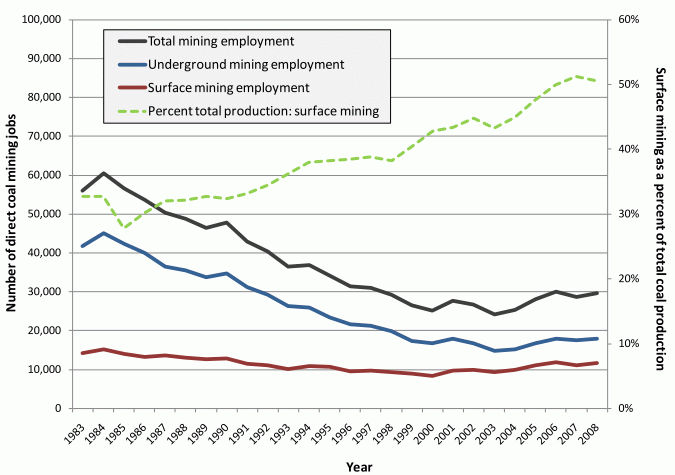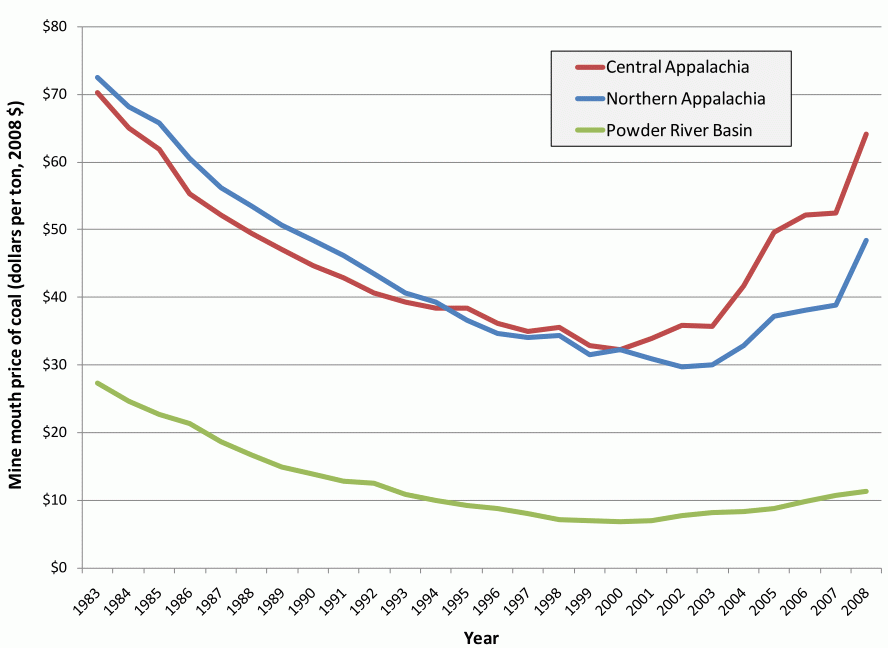Last Friday, the EPA took a significant step toward blocking a Clean Water Act permit for Arch Coal’s Spruce Mine, the largest proposed mountaintop-removal coal mine in West Virginia history. It’s a big deal — see Ken Ward Jr. for more on what it means and what comes next.
I just wanted to highlight the reactions of West Virginia legislators. See if anything jumps out. Here’s Rep. Nick Rahall (D):
This is an unprecedented, unjustified and undeserved decision and I completely disagree with it as I told EPA Administrator Lisa Jackson directly.
Rep. Shelly Moore Capito (R):
Today’s announcement by the EPA to begin the veto process for the Spruce Mine permit confirms what many have long suspected: the Agency has no regard for the economic hardship created by their policies, or for the judgment and authority of the state and federal agencies involved.
Sen. Jay Rockefeller (D):
I have said this before, and will say it again: it is wrong and unfair for the EPA to change the rules for a permit that is already active.
 Sen. Robert ByrdNow, here’s Sen. Robert Byrd (D):
Sen. Robert ByrdNow, here’s Sen. Robert Byrd (D):
The announcement by the EPA today of its Proposed Determination to exercise its veto authority over the Spruce #1 Mine permit begins a process that enables the company and the public to comment on the matter in writing and at public hearings. I would strongly encourage all parties to seek a balanced, fair, reasonable compromise.
What makes Byrd’s measured, conciliatory statement so remarkable is not just its contrast with the other three reactions but its contrast with a long career spent fervently defending the coal industry against any regulation or restraint. Byrd has been been scrapping for coal in Congress since 1952, nine years before Barack Obama was born. But this isn’t the first sign that he’s gone rogue on coal — in Dec. 2009 he issued a remarkable statement condemning the “fear mongering” and “grandstanding” used by coal proponents against Obama’s administration.
What’s going on? What, in the twilight of his career, has led the longest serving member of Congress to rethink coal’s place in modern Appalachia? A cynical sort might point out that the senator has been hospitalized several times in recent years and is reportedly in fragile health. Perhaps his staff has mostly taken over.
Or maybe it’s just Byrd finally accepting the inevitable: coal has to change. Perhaps he read “The Decline of Central Appalachian Coal and the Need for Economic Diversification” (PDF). He has lived through a precipitous drop in mining employment:
 Graph: Downstream Strategies
Graph: Downstream Strategies
Some mining companies have cut their workforce by 90 percent in the last 40 years, shifting from underground mining to mountaintop removal. Coal now employs just 2 percent of Appalachians. The supply of Appalachian coal is declining as well, pushing the price out of competitive range:
 Graph: Downstream Strategies
Graph: Downstream Strategies
More broadly, a recent study from West Virginia University found that for Appalachia, the health costs of coal mining exceed its job and economic benefits by more than five to one. West Virginia ranks 49th in terms of income; its waterways are poisoned with mercury, its streams are buried, its mountains lie in rubble.
It simply can’t continue. As Byrd said, “West Virginians can choose to anticipate change and adapt to it, or resist and be overrun by it.” It’s the message the state’s residents need to hear, but most of its elected officials lack the foresight or courage to tell them. There’s something poetic about the fact that their most venerated elder is the first to realize that it’s time to start letting go.
——
Bonus Byrd!


